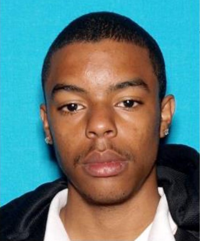MEDFORD, Ore. — Jury selection is underway at the federal courthouse in Medford for the trial of Negasi Zuberi.
30-year-old Negasi Zuberi of Klamath Falls entered the courtroom today facing eight federal criminal counts. They include kidnapping, transportation for criminal sexual activity, weapons and attempted escape charges.
U.S. District Court Chief Judge Michael McShane and lawyers in the case are using the jury selection process today to screen prospective jurors in groups of 20 at the James A. Redden Federal Courthouse in Medford. Selected jurors will hear Zuberi’s federal case in a trial planned for three weeks’ duration.
McShane noted that one prospective juror called in to report her mother’s heart attack and another contracted norovirus, setting aside a few jurors before today’s jury selection screening process, or voir dire, started.
Lawyers in the case asked prospective jurors about their perspectives regarding guns and gun laws, sex workers, law enforcement, credibility, bias and fairness regarding aspects of the pending case. For example, one prospective juror noted she has police experience in death investigation, saying she understands the justice process and can be fair.
Some jurors said they’d seen, heard and/or read about Zuberi’s case from local news coverage. Only one of those prospective jurors said she had developed an opinion about the case that prevents her from being objective, and Judge McShane excused her from the case.
Zuberi’s case got news media coverage, including some national attention, after his arrest in July 2023 for allegations that he impersonated a police officer to take a sex worker from an area near Seattle, Washington, driving her to his Klamath Falls home. The case accuses him of using a weapon to hold the woman captive, sexually violating her at stops during the interstate drive that ended in his garage where she was put in a cinder block captivity cell with a steel door that Zuberi reportedly built in the Klamath Falls home he rented with his partner and two children.

Police image of a home-made captivity cell Zuberi is accused of using.
At the time, local police and federal investigators said the victim beat the door open with her bare hands during her first day of captivity, taking Zuberi’s handgun from his vehicle during her escape that led to a passerby helping her go to police in Klamath Falls. Police in Reno, Nevada, later arrested Zuberi there after a police standoff in a parking lot after they located him in his car.
Federal investigators at the time said they thought Zuberi could have other victims in the United States and shared their account of Zuberi’s accused crimes with news media to possibly find them. Zuberi’s case under trial now includes a second victim.
Judge McShane ordered prospective jurors to not use media, including news coverage and social networks, during this proceeding, effective immediately, even including the next courtroom break, because they cannot talk about the case even to other jurors during the trial proceeding, starting with jury selection.
This morning, the federal court swore in 39 jurors for questions by lawyers, after the prospective jurors submitted their written responses to jury duty questionnaires last week. More prospective jurors were questioned this afternoon,
Some prospective jurors said they have travel plans or personal obligations, which Judge McShane said were not likely to get them excused from jury duty.
Some questioning by the lawyers asked prospective jurors about their regard for sex workers and their credibility. Though most prospective jurors said they could be fair to those witnesses, further questioning of one prospective juror who’d said she fairly could consider a sex worker’s testimony as a witness revealed that the juror’s religion, by her admission, would prevent her from treating a sex worker fairly. Judge McShane excused her from the jury pool.
Some jurors said they’d like to know more information about a person’s criminal background before deciding about a felon-weapon-possession charge. They said they could follow a judge’s instructions about that charge, whether they have the background information.
When asked about sex workers testimony, one juror said he’d question their credibility. That same prospective juror also said, “Police are as bad as the people they arrest.” When a federal government lawyer asked if he could be fair and impartial to both sides of this case, the juror replied, “I would do my best. I think I would do a fair job because that’s what the court is asking me to do.”

Negasi Zuberi photo prior to 2023 case
This post was originally published on this site be sure to check out more of their content.








